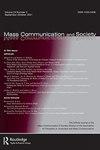道德基础、意识形态分歧和公众参与与美国政府机构在社交媒体上的COVID-19疫苗沟通
IF 2.7
2区 文学
Q1 COMMUNICATION
引用次数: 3
摘要
在道德基础理论的指导下,本研究考察了道德框架如何与当地选民的意识形态倾向相互作用,从而影响政府机构在Facebook上进行COVID-19疫苗宣传的公众参与结果。我们分析了5000多个美国政府机构在2021年关于COVID-19疫苗的Facebook帖子的数据集(N = 70,671),使用新开发的计算方法评估了他们对道德语言的使用,并研究了政治分歧如何在集体层面上表现出来。固定效应和随机效应模型的研究结果表明:1)道德语言的使用与政府机构社交媒体账户的公众参与结果正相关;2)五种类型的道德基础对三种类型的公众参与(情感、认知和再传播)有显著影响;3)道德基础和地方政治相互作用影响公众参与。在自由主义的州/县,政府机构的追随者更喜欢强调关心/伤害和公平/欺骗维度的信息,而在保守主义的州/县,他们更喜欢忠诚/背叛维度的信息。本研究展示了策略性地使用道德语言如何有助于公众参与政府机构的大众传播活动。(PsycInfo数据库记录(c) 2022 APA,版权所有)本文章由计算机程序翻译,如有差异,请以英文原文为准。
Moral Foundations, Ideological Divide, and Public Engagement with U.S. Government Agencies’ COVID-19 Vaccine Communication on Social Media
Guided by moral foundation theory, this study examined how moral framing interacted with local constituents' ideological leaning to affect public engagement outcomes of government agencies' COVID-19 vaccine communication on Facebook. We analyzed a dataset of over 5,000 U.S. government agencies' Facebook posts on COVID-19 vaccines in 2021 (N = 70,671), assessed their use of moral language using a newly developed computational method, and examined how political divide manifests itself at the collective level. Findings from both fixed and random effects models suggest that: 1) the use of moral language is positively associated with public engagement outcomes on government agencies' social media accounts;2) five types of moral foundations have distinct effects on three types of public engagement (affective, cognitive, and retransmission);3) moral foundations and local politics interact to affect public engagement, in that followers of government agencies in liberal states/counties prefer messages emphasizing the care/harm and fairness/cheating dimensions while those in conservative states/counties prefer the loyalty/betrayal dimension. The study demonstrates how a strategic employment of moral language can contribute to public engagement of government agencies' mass communication campaigns. (PsycInfo Database Record (c) 2022 APA, all rights reserved)
求助全文
通过发布文献求助,成功后即可免费获取论文全文。
去求助
来源期刊

Mass Communication and Society
COMMUNICATION-
CiteScore
6.90
自引率
3.30%
发文量
58
期刊介绍:
Mass Communication and Society" mission is to publish articles from a wide variety of perspectives and approaches that advance mass communication theory, especially at the societal or macrosocial level. It draws heavily from many other disciplines, including sociology, psychology, anthropology, philosophy, law, and history. Methodologically, journal articles employ qualitative and quantitative methods, survey research, ethnography, laboratory experiments, historical methods, and legal analysis.
 求助内容:
求助内容: 应助结果提醒方式:
应助结果提醒方式:


